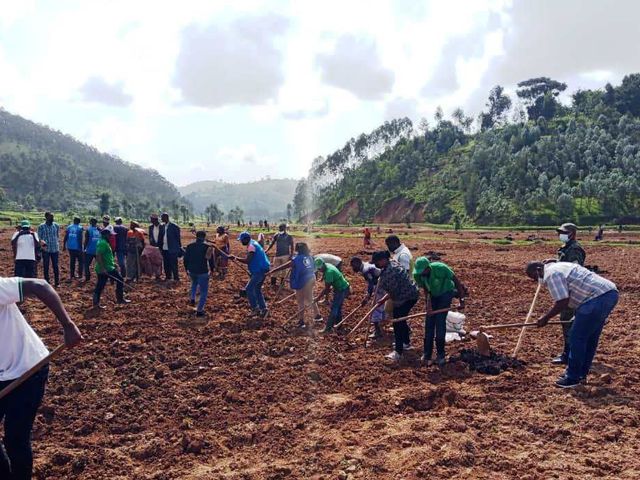Farm to Market Alliance-FtMA facilitated 1427 smallholder farmers made of 500 refugees from the Kigeme camp and other 927 farmers from the host community to integrate professional farming through “Koperative Duhuzimbaraga Mushishito-CODUMU Coop” whose members grow maize on 47Ha of Mushishito marshland located in Winkingi and Kibirizi Sectors in Nyamagabe District.
Kabanda Jean Bosco, a refugee in Kigeme camp and active member of CODUMU, revealed that each farmer was given three Ares (3Ares) of land in Mushishito marshland, and got technical support from FtMA through Rwanda Rural Rehabilitation Initiative-RWARRI. “Refugees had never thought that one day they could become skilled farmers in a foreign country,” he added.
Thus, Kabanda acknowledged that CODUMU coop members got trainings on Good Agriculture Practices and Post-Harvest Handling and Storage. “As our farming skills were increased, we, therefore, increased the quantity and the quality of our maize produce for 2022B season”, he pointed out.
Indeed, CODUMU members aggregated and sold about 48.512 Metric tons (Mt) of grade one to the Gikongoro Catholic Diocese at 610Rwf per kilogram equivalent to 29,592,320Rwf for all sales. The money that the coop members got from sales helped them to solve their respective families’ issues, including paying fees for health insurance, school tuition, savings, loans, and modern farming technologies for host community members and for refugees, this money was particularly used to pay their basic needs including food and clothes.
Initially Mushishito Marshland was shared between COPIMU and Urumuri Mushishito cooperatives, which were technically assisted by RWARRI since 2017 under FtMA project. Later on, these two coops integrated 500 refugees to form Mushishito farmers group, which became CODUMU coop in 2022.
Farm to Market Alliance-FtMA is a World Food Program-WFP funded project that implements interventions including helping smallholder farmers transition to commercial agriculture by providing adequate information, investment, and support at all stages, from seed to market and empowering smallholder farmers to become reliable market players through access to four integrated pathways which are predictable markets, affordable finance, technologies, and quality inputs, such as seeds, fertilizers, and post-harvest handling and storage solutions.
